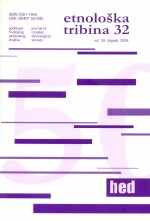Etnologija kao nastavni predmet u Hrvatskoj 1931. – 1945.
Ethnology as part of the curriculum in Croatia 1931 – 1945
Author(s): Marina ŠkrabaloSubject(s): Government/Political systems, Cultural Anthropology / Ethnology, School education, History of Education, State/Government and Education, Interwar Period (1920 - 1939), WW II and following years (1940 - 1949)
Published by: Hrvatsko etnološko društvo
Keywords: ethnology; curriculum; ideology; political regimes;
Summary/Abstract: By analyzing the content of curriculum and aids it is possible to establish a relation between ethnology as a curriculum unit and the specific ideological background of its pedagogical and educational function in a specific historical context. This also forms the foundation of the story of ethnology in the curriculum in the politically turbulent period between the two world wars and during the Second World War. The changes in educational systems were brought about by the changes of governmental systems; therefore, the characteristics of ethnology in the curriculum and its pedagogical and educational purpose can be grouped in three main temporal and social units: ethnology in the curriculum of the Kingdom of Yugoslavia from 1931 till 1939, ethnology in the curriculum of the Banovina of Croatia within the Kingdom of Yugoslavia from 1939 till April 1941, and ethnology in the curriculum of the Independent State of Croatia from April 1941 till May 1945. The main characteristics of ethnology as part of the curriculum in the Kingdom of Yugoslavia can be reduced to relating ethnology and ethnography; ethnology was defined as the science about peoples and the origin and development of culture, and ethnography as the description of particular traditional culture of a people. The main emphasis is on the anthropogeographically and evolutionary structured and interpreted overview of cultural phenomena of humanity in the past and present. Ethnology, as a curriculum subject in the Banovina of Croatia, represented a cultural and historical overview of cultural phenomena of various peoples, with the focus on the ethnography of Croats. Ethnology was defined as the science of the history of culture and the definition, taken over from Antun Radić, is “everything that makes man’s life easier and more beautiful”, and people, again according to Radić’s interpretation, is identified with peasants. Ethnology as part of the curriculum in the Independent State of Croatia took over the characteristics of ethnology from the previous period and remodeled them according to the ruling ideology, the core of which was the idea of the Croatian national state as the key factor of survival of the Croatian people, while the social actions of the individual have necessarily be directed towards the strengthening of the state. However, it is surprising that the scope of ethnology’s activities in the construction of the new social and cultural project was very modest, since the total number of lessons, as well as the number of schools in which it was being taught, was small, and the classes were generally irregular and reduced. A special unit of ethnology in the curriculum is the curricular basis taught in the area under ZAVNOH’s (State Antifascist Council of the National Liberation of Croatia) administration during the war and in the first academic years during People’s Republic of Croatia. At that time ethnology was no longer an independent curricular unit; its knowledge existed within the curriculum of geography, but it can still be supposed that it represented a complete smaller curricular unit.
Journal: Etnološka tribina : Godišnjak Hrvatskog etnološkog društva
- Issue Year: 39/2009
- Issue No: 32
- Page Range: 57-74
- Page Count: 18
- Language: Croatian

